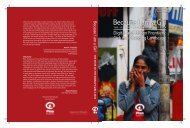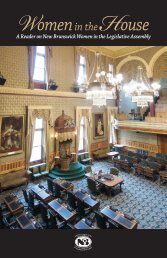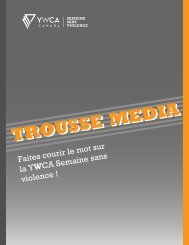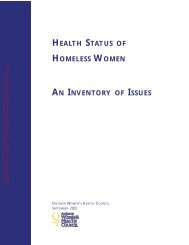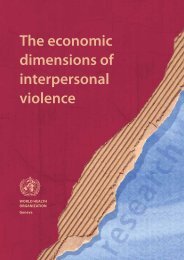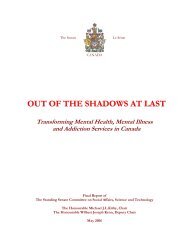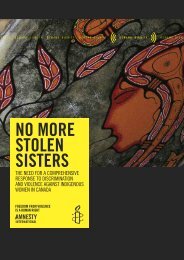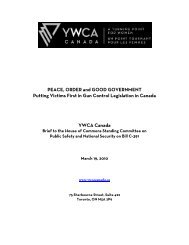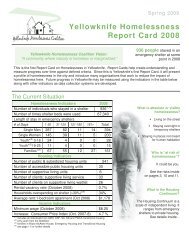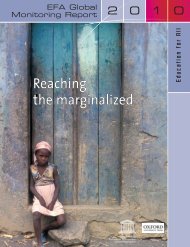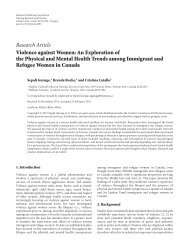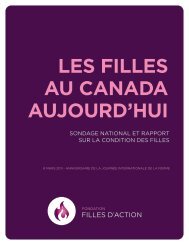Gender Report Card on the International Criminal ... - YWCA Canada
Gender Report Card on the International Criminal ... - YWCA Canada
Gender Report Card on the International Criminal ... - YWCA Canada
Create successful ePaper yourself
Turn your PDF publications into a flip-book with our unique Google optimized e-Paper software.
Judiciary – Key Decisi<strong>on</strong>s Legal Representati<strong>on</strong><br />
Yillah can be c<strong>on</strong>sidered ‘defence counsel […] practising<br />
at <strong>the</strong> […] Court’ for <strong>the</strong> purposes of <strong>the</strong> Code of<br />
C<strong>on</strong>duct and that as such, he was subject to that Code.<br />
However, <strong>the</strong> Chamber also noted that, pursuant<br />
to Article 16(1) of <strong>the</strong> Code of C<strong>on</strong>duct, <strong>the</strong> primary<br />
resp<strong>on</strong>sibility for avoiding or addressing a c<strong>on</strong>flict<br />
of interest lies with individual counsel, although in<br />
case of a dispute <strong>the</strong> Chamber has <strong>the</strong> resp<strong>on</strong>sibility<br />
of resolving <strong>the</strong> matter in order to facilitate <strong>the</strong> fair<br />
c<strong>on</strong>duct of proceedings. 1981<br />
Article 12(1)(b) of <strong>the</strong> Code of C<strong>on</strong>duct states that<br />
appointment of counsel shall be barred if counsel was<br />
(i) involved or (ii) privy to c<strong>on</strong>fidential informati<strong>on</strong> as<br />
a staff member of <strong>the</strong> Court relating to <strong>the</strong> case in<br />
which counsel seeks to appear. The Chamber noted<br />
that <strong>the</strong> first alternative provided herein does not<br />
apply to <strong>the</strong> current instance, as <strong>the</strong> Prosecuti<strong>on</strong><br />
acknowledged Yillah was not involved in <strong>the</strong> Banda<br />
& Jerbo case during his employment with <strong>the</strong> OTP. 1982<br />
The Chamber <strong>the</strong>n examined <strong>the</strong> sec<strong>on</strong>d issue, holding<br />
that substantial c<strong>on</strong>fidential informati<strong>on</strong> was not<br />
necessary to satisfy this requirement and that <strong>the</strong><br />
appropriate test was whe<strong>the</strong>r Yillah has knowledge<br />
of more than de minimis c<strong>on</strong>fidential informati<strong>on</strong> of<br />
relevance to <strong>the</strong> case which a member of <strong>the</strong> defence<br />
team should not possess. The Chamber noted that<br />
<strong>the</strong> Prosecuti<strong>on</strong>’s claims regarding Yillah’s access to<br />
c<strong>on</strong>fidential informati<strong>on</strong> were general and not based<br />
<strong>on</strong> any specific evidence or supporting material.<br />
Although Yillah’s employment with <strong>the</strong> OTP may have<br />
given him an insight into <strong>the</strong> functi<strong>on</strong>ing of that office,<br />
<strong>the</strong> Prosecuti<strong>on</strong> had d<strong>on</strong>e nothing more than suggest<br />
he had any knowledge or c<strong>on</strong>fidential informati<strong>on</strong><br />
relating to this specific case. 1983 In <strong>the</strong> absence of any<br />
reas<strong>on</strong> to doubt Yillah’s integrity, <strong>the</strong> Chamber was<br />
entitled to rely <strong>on</strong> his clear asserti<strong>on</strong>s. Therefore, <strong>the</strong><br />
Chamber c<strong>on</strong>cluded that <strong>the</strong>re were no persuasive<br />
indicati<strong>on</strong>s that a c<strong>on</strong>flict of interest existed in <strong>the</strong><br />
present case or that Yillah’s appointment would be<br />
prejudicial to <strong>the</strong> proceedings. The Prosecuti<strong>on</strong>’s<br />
moti<strong>on</strong> to invalidate his appointment was <strong>the</strong>refore<br />
denied.<br />
On 6 July, <strong>the</strong> Prosecuti<strong>on</strong> filed for leave to appeal this<br />
decisi<strong>on</strong> <strong>on</strong> <strong>the</strong> following two grounds: 1984<br />
n<br />
n<br />
whe<strong>the</strong>r, as a matter of law, prosecuti<strong>on</strong> lawyers<br />
may join a defence team for a case which was<br />
open at <strong>the</strong> time that pers<strong>on</strong> worked for <strong>the</strong> OTP,<br />
or whe<strong>the</strong>r <strong>the</strong>y should be barred from taking up<br />
employment with <strong>the</strong> defence for a period of time<br />
no less than a year (given that <strong>the</strong> Prosecuti<strong>on</strong><br />
argued all former prosecuti<strong>on</strong> lawyers have a<br />
c<strong>on</strong>flict of interest per se); and<br />
whe<strong>the</strong>r <strong>the</strong> Chamber had properly c<strong>on</strong>sidered<br />
and weighed <strong>the</strong> prosecuti<strong>on</strong>’s claim that Yillah<br />
was privy to c<strong>on</strong>fidential prosecuti<strong>on</strong> informati<strong>on</strong><br />
against Yillah’s asserti<strong>on</strong> that he was unaware of<br />
any c<strong>on</strong>fidential informati<strong>on</strong> relating to <strong>the</strong> Banda<br />
& Jerbo case.<br />
The defence resp<strong>on</strong>ded <strong>on</strong> 8 July 2011, opposing leave<br />
to appeal and arguing that <strong>the</strong> Prosecuti<strong>on</strong> applicati<strong>on</strong><br />
did not satisfy <strong>the</strong> standard for an appealable issue<br />
under Article 82(1)(d). 1985 On 13 July 2011, <strong>the</strong><br />
Chamber granted <strong>the</strong> Prosecuti<strong>on</strong> leave to appeal<br />
<strong>on</strong>ly <strong>the</strong> first issue, which it c<strong>on</strong>sidered to satisfy <strong>the</strong><br />
requirements for an ‘appealable issue’ under Article<br />
82(1)(d). 1986 As regards <strong>the</strong> Prosecuti<strong>on</strong>’s sec<strong>on</strong>d<br />
proposed ground of appeal, <strong>the</strong> Chamber held that<br />
<strong>the</strong> Prosecuti<strong>on</strong>’s disagreement with <strong>the</strong> Chamber’s<br />
c<strong>on</strong>clusi<strong>on</strong> <strong>on</strong> this matter did not give rise to an<br />
appealable issue under Article 82(1)(d), as <strong>the</strong> Appeals<br />
Chamber had previously held that an appealable issue<br />
is not merely <strong>on</strong>e over which <strong>the</strong>re is disagreement or<br />
c<strong>on</strong>flicting opini<strong>on</strong>s. The Prosecuti<strong>on</strong> was <strong>the</strong>refore<br />
granted leave to appeal <strong>the</strong> first issue, but not <strong>the</strong><br />
sec<strong>on</strong>d. At <strong>the</strong> time of writing, no decisi<strong>on</strong> has yet been<br />
issued <strong>on</strong> this appeal.<br />
1981 ICC-02/05-03/09-168, paras 11-12.<br />
1982 ICC-02/05-03/09-168, para 14.<br />
1983 ICC-02/05-03/09-168, para 21.<br />
1984 ICC-02/05-03/09-173.<br />
1985 ICC-02/05-03/09-175.<br />
1986 ICC-02/05-03/09-179.<br />
309





